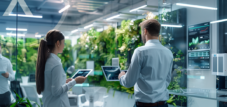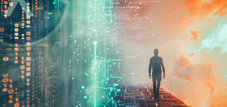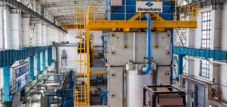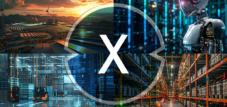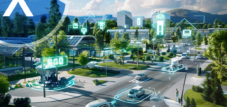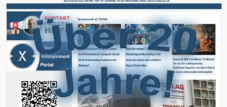Twin transformation in the areas of digitalization and sustainable production methods to reduce CO2 emissions
Language selection 📢
Published on: September 28, 2024 / update from: September 28, 2024 - Author: Konrad Wolfenstein
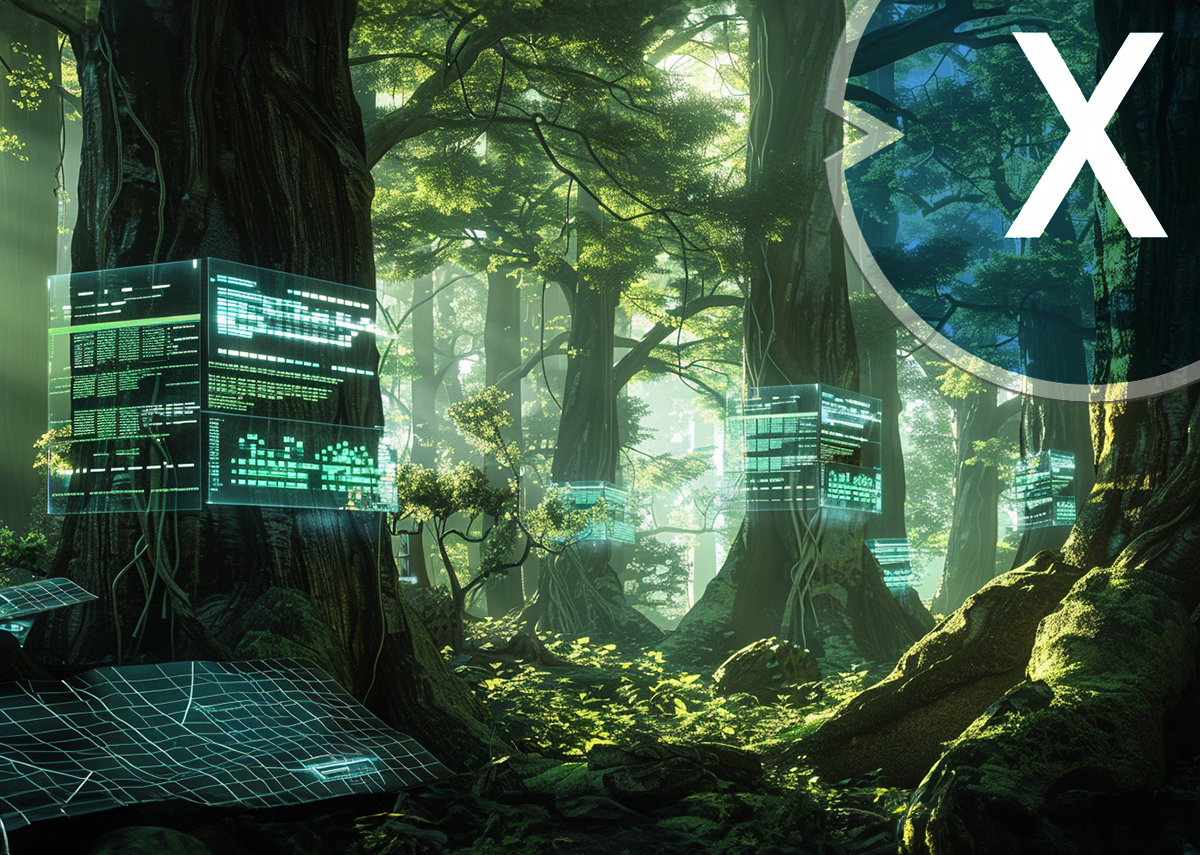
Twin transformation in the areas of digitalization and sustainable production methods to reduce CO2 emissions - Image: Xpert.Digital
🌍💻 The importance of twin transformation for our future
🤖 Sustainability and AI: A powerful duo for twin transformation
The twin transformation is a concept that describes simultaneous progress in the areas of digitalization and sustainability. In a world increasingly characterized by technological innovation and a growing awareness of the environment, this issue is increasingly becoming the focus of companies, governments and society as a whole. Digitalization and sustainability are two of the most important challenges of our time today, and combining these two processes promises to enable a transformation that is not only economically but also ecologically sustainable. Artificial intelligence (AI) in particular plays a central role and opens up possibilities that were previously considered unimaginable. It can help reduce CO2 emissions, promote sustainable production methods and drastically improve efficiency in many areas.
🌐💡 What is the Gemini Transformation?
The idea of twin transformation assumes that digitalization and sustainability should not be viewed as isolated phenomena. Rather, they are mutually dependent and together offer a strong lever for achieving both economic and ecological goals. Digitalization is often seen as a driver for increasing efficiency and innovation, while sustainability emphasizes the need to shape our ways of life and production so that they leave future generations a livable environment.
The twin transformation therefore represents an attempt to unite the two megatrends. This requires not only technical innovations, but also a rethinking of business models, production methods and consumer behavior. Companies that take on this challenge have the opportunity not only to operate more sustainably, but also to gain competitive advantages in an increasingly digitalized and environmentally conscious world.
🤖🔋 The role of artificial intelligence (AI) in twin transformation
Artificial intelligence (AI) is a key tool in the twin transformation as it is able to accelerate and optimize both digital and sustainable processes. A central area of application of AI is the analysis of large amounts of data, which are currently generated in almost all industries. This data is a valuable resource for making both sustainable and digital decisions.
One example is the energy sector. AI can help optimize energy consumption by predicting demand more accurately and using resources more efficiently. Smart power grids based on AI-powered systems can control the flow of energy in real time , thereby minimizing losses. This not only reduces costs, but also reduces CO2 emissions as less energy is wasted.
AI can also make a major contribution in the area of logistics and transport. Intelligent route planning based on real-time data can optimize supply chains and reduce emissions. Self-learning systems can make the transport of goods and people more efficient by better controlling traffic on the roads and thus avoiding traffic jams and unnecessary waiting times.
The potential of AI is also evident in agriculture. Smart agricultural systems use sensor data and AI algorithms to minimize the use of water, fertilizer and pesticides. This not only contributes to greater efficiency, but also significantly reduces the environmental impact of agricultural production. At the same time, the precise use of resources can increase yields and reduce crop losses.
🌿💻 Sustainability through digitalization: concrete applications
Digitalization enables a variety of approaches to achieve sustainability goals. A particularly important concept in this context is the circular economy. This relies on reuse, recycling and minimizing waste in order to use raw materials more efficiently and reduce environmental impact. Digital technologies play a crucial role here as they increase transparency along the value chain and thus improve the traceability of products and materials.
Another example is the use of digital twins in industry. A digital twin is a virtual representation of a physical object or process that allows data to be collected and analyzed in real time. By using this technology, companies can optimize their production processes by identifying and eliminating weak points at an early stage. This not only leads to a reduction in rejects and waste, but also saves energy and resources.
Digitalization also contributes to sustainability in the construction industry. By using Building Information Modeling (BIM), construction projects can be planned and implemented more efficiently. This allows for better use of materials and reduction in construction waste. In addition, the energy consumption of buildings can be optimized through smart systems that monitor and control energy requirements in real time.
🚀🌱 Challenges and opportunities of twin transformation
Despite the numerous opportunities that the Gemini transformation offers, there are also some challenges. One of the biggest hurdles is the complexity of switching to digital and sustainable processes. Many companies are faced with the task of fundamentally rethinking existing structures and business models. This not only requires significant investments in new technologies, but also a cultural rethink within organizations.
Another problem is the so-called “rebound effect”. This describes the phenomenon that efficiency gains are often compensated for by technological innovations by higher overall consumption. For example, it can happen that savings in energy consumption are canceled by the introduction of more efficient devices by increased use of these devices. It is important here that digital solutions not only bring short -term efficiency gains, but also contribute to reducing resource consumption in the long term.
Nevertheless, the twin transformation offers enormous opportunities. Companies that adapt to this change early on can secure competitive advantages and open up new business areas. At the same time, they help to reduce the ecological footprint and thus actively contribute to protecting the environment. This can be a crucial factor in a company's success, especially at a time when consumers and investors are increasingly paying attention to sustainability.
🔮🔧 Future prospects of twin transformation
The future of twin transformation is closely linked to the advancement of technologies such as AI, the Internet of Things (IoT) and blockchain. These technologies offer the potential to further advance the connection between digitalization and sustainability and to develop new solutions for the challenges of our time.
In the future, AI will contribute even more to optimizing processes in real time and supporting sustainable decisions. IoT devices that are connected to each other enable even more precise monitoring and control of resources. At the same time, blockchain technology can further improve the transparency and traceability of products and materials, which is particularly important with regard to the circular economy.
The twin transformation will therefore play an increasingly larger role in the coming years and help shape a more sustainable and digital future. Companies and organizations that actively promote this change will not only benefit ecologically but also economically. The combination of digitalization and sustainability is the key to mastering the challenges of the 21st century and securing a future worth living for future generations.
♻️🔍 Simultaneous implementation of digitalization and sustainability
The twin transformation, i.e. the simultaneous implementation of digitalization and sustainability, is a forward-looking concept that sets the course for a sustainable economy. Artificial intelligence, digital twins and smart technologies play a central role in combining ecological and economic goals. Companies that embrace this transformation can not only increase their competitiveness, but also make an important contribution to climate protection. The challenges are great, but the opportunities that arise from combining digitalization and sustainability are even greater.
📣 Similar topics
- 📊 The role of AI in twin transformation
- 🌍 Sustainability through digitalization: How modern technology protects the environment
- 🔄 Circular economy and digitalization: A symbiosis for sustainable resources
- 📦 Optimization of logistics through AI: efficient transport and reduced emissions
- 🌱 Smart agricultural systems: AI in agricultural production
- 🏗️ Building Information Modeling (BIM) in construction: Efficiency through digitalization
- 🔋 Smart power grids: AI-controlled energy systems for a sustainable future
- 🛤️ Challenges and Opportunities of Gemini Transformation
- 💡 Artificial intelligence as a key tool for digital and sustainable processes
- 📈 Future prospects of twin transformation: technologies of tomorrow
#️⃣ Hashtags: #Digitalization #Sustainability #ArtificialIntelligence #Circular Economy #Future Technologies
Our recommendation: 🌍 Limitless reach 🔗 Networked 🌐 Multilingual 💪 Strong sales: 💡 Authentic with strategy 🚀 Innovation meets 🧠 Intuition
At a time when a company's digital presence determines its success, the challenge is how to make this presence authentic, individual and far-reaching. Xpert.Digital offers an innovative solution that positions itself as an intersection between an industry hub, a blog and a brand ambassador. It combines the advantages of communication and sales channels in a single platform and enables publication in 18 different languages. The cooperation with partner portals and the possibility of publishing articles on Google News and a press distribution list with around 8,000 journalists and readers maximize the reach and visibility of the content. This represents an essential factor in external sales & marketing (SMarketing).
More about it here:
🌐♻️ The twin transformation - a paradigm shift for business and society
🌟✨ Today we are facing two major social challenges that will significantly shape our future: the digital revolution and the change towards more sustainability.
💻📈 Digitalization as an opportunity and challenge
Digitalization permeates almost all areas of life and is changing the way we work, communicate and consume. It offers enormous opportunities to increase efficiency and save resources, but also poses risks if it progresses uncontrolled.
A central aspect of digital transformation is the development and application of artificial intelligence (AI). AI systems can carry out complex data analyzes and optimize processes, which can lead to significant CO2 savings in many areas. For example, intelligent energy management systems can significantly reduce electricity consumption in buildings by controlling heating, cooling and lighting as needed.
🌍🌱 Sustainability as a task for society as a whole
Parallel to the digital revolution, a rethinking of sustainability and climate protection is taking place. The United Nations' 17 Sustainable Development Goals form a normative compass for business, politics and civil society. It's about balancing economic growth with ecological responsibility and social justice.
🤝⚡ Use synergies, avoid conflicts
The challenge is to specifically use the potential of digitalization for greater sustainability while minimizing negative impacts. This requires a holistic approach that combines technological innovations with ecological and social aspects.
An example of successful twin transformation can be found in the energy industry: Intelligent power grids, so-called smart grids, enable more efficient use of renewable energies . By using AI and IoT technologies, electricity production can be better adapted to actual needs, leading to a reduction in surpluses and a more stable supply.
🔄♻️ Circular economy as a future model
Another important aspect of the twin transformation is the promotion of a circular economy. Digital technologies can make a decisive contribution here by improving the traceability of products and materials and thus making recycling and reuse easier.
There are already innovative approaches in the textile industry in which garments are tagged with digital labels that contain information about material composition and production methods. This enables more efficient sorting and recycling at the end of the product life cycle.
🧩💡 Challenges and solutions
Despite the promising potential of twin transformation, there are also challenges to overcome. The increasing energy demand due to increasing digitalization must be addressed in order not to counteract the sustainability gains. Innovative solutions are required here, such as the development of energy-efficient hardware and the use of renewable energy for data centers.
In addition, the twin transformation requires new competencies and skills. Education and further training play a key role in preparing people for changing requirements and enabling them to actively participate in shaping a sustainable digital future.
🏛️📊 Political framework and support measures
In order to fully exploit the potential of the twin transformation, suitable political framework is required. In Germany, the Federal Ministry of Education and Research (BMBF) has with the action plan “of course. Digital. Sustainable." Important basics created to systematically bring together digitization and sustainability.
Funding programs and research initiatives aim to advance digital sustainability innovations and test their practical suitability. A holistic approach is pursued, which extends from basic research to application and includes various sectors.
🏢🌟 Practical examples and best practices
Numerous companies and organizations have already recognized that the combination of digitalization and sustainability holds enormous potential. A practical example is the implementation of digital document management systems, which not only save paper, but also make processes more efficient and thus indirectly contribute to climate protection.
In agriculture, precision farming technologies enable more resource-efficient management of arable land. Sensors and AI-supported analysis methods help farmers optimize the use of fertilizers and pesticides while increasing yields.
🚀🏭 The role of companies and start-ups
Innovative start-ups play an important role in developing sustainable digital solutions. They often have the agility and creativity necessary to develop new business models that are both economically successful and ecologically compatible. Established companies can benefit from collaborations with such start-ups and accelerate their own transformation.
🗣️👥 Social discourse and participation
The twin transformation affects all areas of society and therefore requires a broad discourse and the involvement of various stakeholders. Citizens should be actively involved in decision-making processes in order to create acceptance for changes and take local needs into account.
Initiatives such as the Summer School “Fit for Future” in the Lichtenfels district show how young people can sensitize the topics of digitization and sustainability and become active designers of the transformation. Such educational offers not only promote understanding of complex relationships, but also strengthen regional identity and innovative strength.
🌟🔄 For sustainable and future-proof development
The twin transformation presents us with major challenges, but also offers enormous opportunities for sustainable and future-proof development. It is important to use the potential of digital technologies in a targeted manner to increase resource efficiency, reduce emissions and establish new, sustainable business models.
The success of this transformation depends largely on how well the various actors from business, politics, science and civil society can be networked and work together on solutions. Interdisciplinary approaches and systemic thinking are required to cope with the complexity of the task.
Ultimately, it's about finding a balance between technological progress and ecological responsibility, between economic efficiency and social justice. The twin transformation offers the opportunity to fundamentally redesign our society and economy - more sustainable, inclusive and future-proof. It is up to all of us to seize this opportunity and play an active role in shaping a future worth living.
📣 Similar topics
- 🌐 The digital revolution and its potential
- ♻️ Sustainability as an essential factor
- 🤖 Artificial intelligence for the environment
- 🔋 Energy efficiency through intelligent systems
- 🌍 Circular economy of the future
- 🌱 Sustainability in the textile industry
- 📊 Education and training for digital change
- 💡 Political framework and funding
- 🏢 Companies and start-ups as drivers
- 💬 Social discourse on transformation
#️⃣ Hashtags: #digitalization #sustainability #twintransformation #circular economy #energyefficiency
We are there for you - advice - planning - implementation - project management
☑️ SME support in strategy, consulting, planning and implementation
☑️ Creation or realignment of the digital strategy and digitalization
☑️ Expansion and optimization of international sales processes
☑️ Global & Digital B2B trading platforms
☑️ Pioneer Business Development
I would be happy to serve as your personal advisor.
You can contact me by filling out the contact form below or simply call me on +49 89 89 674 804 (Munich) .
I'm looking forward to our joint project.
Xpert.Digital - Konrad Wolfenstein
Xpert.Digital is a hub for industry with a focus on digitalization, mechanical engineering, logistics/intralogistics and photovoltaics.
With our 360° business development solution, we support well-known companies from new business to after sales.
Market intelligence, smarketing, marketing automation, content development, PR, mail campaigns, personalized social media and lead nurturing are part of our digital tools.
You can find out more at: www.xpert.digital - www.xpert.solar - www.xpert.plus







